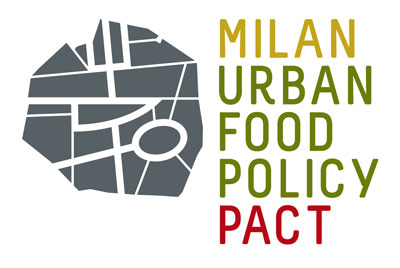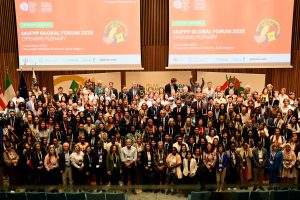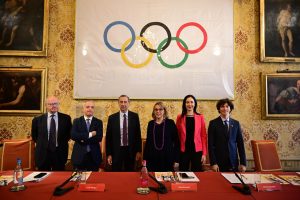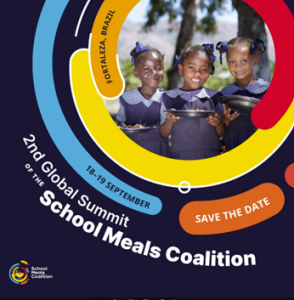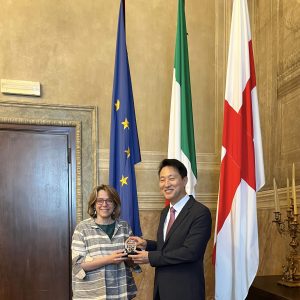Within the MUFPP Global Forum a plenary session was organised on the School Meals Coalition’s Initiative “Cities Feeding the Future”, launched and led in 2023 by the Milan Urban Food Policy Pact. The session, moderated by Filippo Gavazzeni, Director of the Milan Urban Food Policy Pact, was structured into two main segments: a first overview the current worldwide situation of school meals, key tools and projects, followed by a political debate with inspiring cities that are leading outstanding school meals programmes.
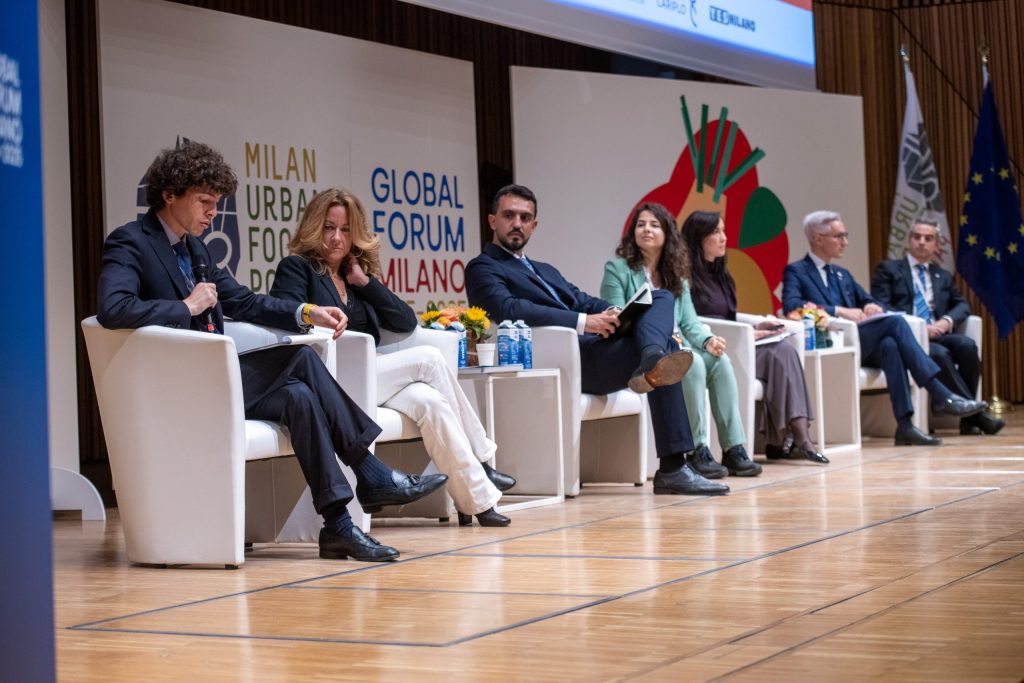
A glimpse into the new State of School Feeding
To set the scene, Maria José Rojas, Head of the School Meals Coalition Secretariat,presented the new “State of School Feeding Worldwide 2024”, a World Food Programme publication, produced within the Data and Monitoring Initiative. The aim was to gather and present data on school meals programmes around the world. For the first time, thanks to the collaboration with Cities Feeding the Future led by the MUFPP, this publication was enriched with bold examples and data from MUFPP cities.
Key figures were shared: in the last four years there has been an increase of children reached with school meals programmes, with 80 million more children reached compared to four years ago. The largest scale up has been observed in the low-income countries, where children need it most. Another critical finding shows that there has been almost double investment in school meals programmes compared to 2020, with 99% from domestic budget. This shows that governments and countries are stepping in for their own programmes, as they recognize that these can contribute to move forward the human capital of their countries. Moreover, Member States realized that investing in school meals brings impact in many other areas, having a multisectorial approach: in terms of financing, investing 1 dollar in school meals generates between $7 – $35 dollars in economic benefits.
The role of the School Meals Coalition has been pivotal in keeping the momentum after the Covid-19 crisis, understanding where the needs are, and how it can support the achievement of the national commitments. Member States are looking at what happens at the regional, but also city-level. In fact, it is significant to notice that 12 regional gatherings have been happening since 2023, led by different countries, 4 of which organized by the Cities Feeding the Future Initiative.
The Global Database on school meals
When the School Meals Coalition was launched, governments realized that data around school meals were not armonized and thus often not comparable. This was creating a big gap in knowledge, so governments expressed the need to create a trustable source of information that could help to track progress on school meals around the world. For this reason, the Data and Monitoring Initiative was launched.
As explained during the session by Espedito Nastro, Deputy Head of the Data and Monitoring initiative, in many contexts countries are already doing a lot on school meals, but they might not be able to make their programmes visible. To address this, the Data and Monitoring Initiative developed the Global Database: it is the most tangible way of looking at the objectives of the School Meals Coalition in one place, bringing together data from a variety of different sources. It includes key indicators and specific information on education, funding, policy and nutritional quality of the meals served. This platform also enables access to the latest publications, country reports and the possibility to download the data.
The Global Database started with a map of countries members of the School Meals Coalition, and it was recently updated with cities. As recounted by Ottavia Pieretto, MUFPP Officer, city-level data were included through dedicated surveys to gather specific data to enrich the database. This is of particular importance as it shows how within the same country, cities might be showing different school meals coverage and challenges they face, leading to a diverse kind of support needed. It can also prove that cities are already at the forefront of school meals improvements and can be inspiring for other cities within the same country or outside, showcasing their efforts and the results they are achieving. Indeed, research is crucial to implement effective policies based on monitored and updated data.
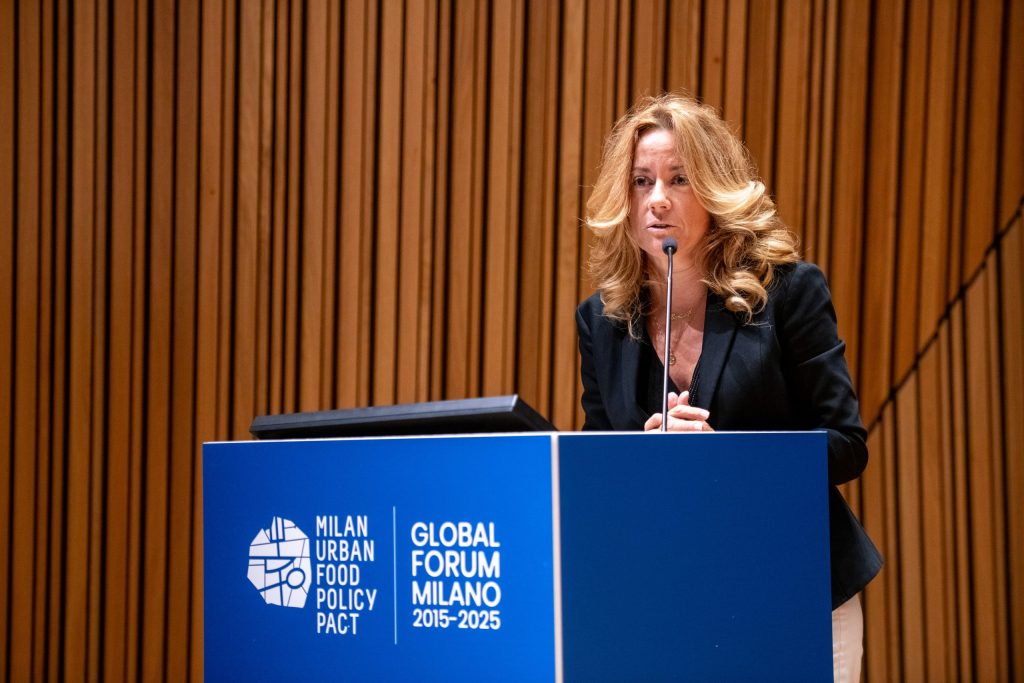
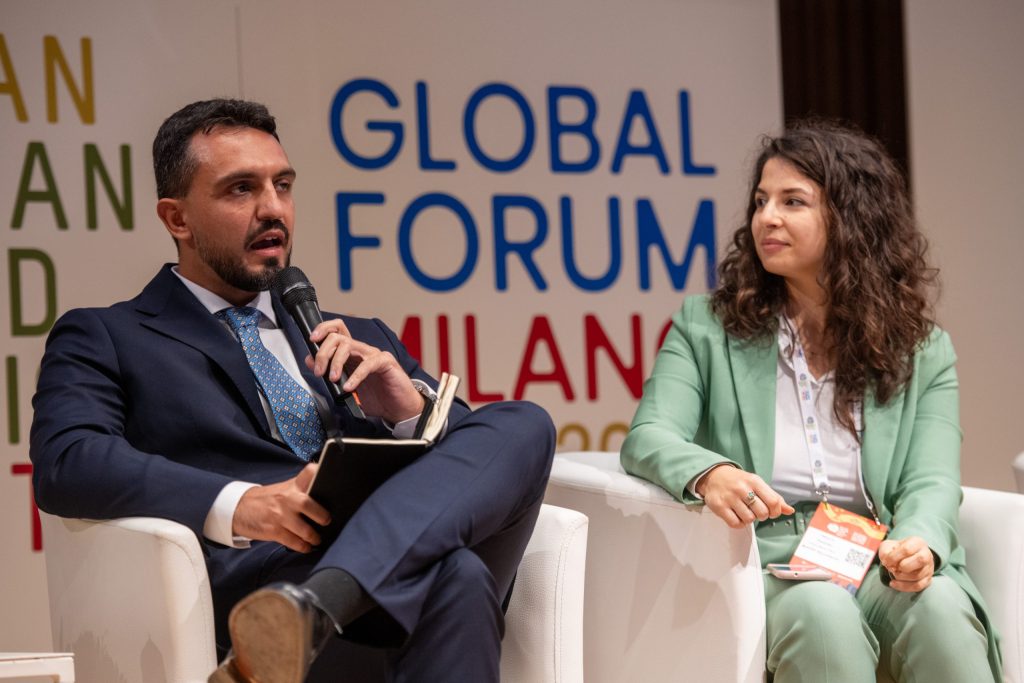
City Case Studies
One of the cities mapped on the Global Database is Milan, the hosting city of this Global Forum. Starting from this city, Andrea Magarini, Director of the Food Policy Department of the city of Milan, explained how, in collaboration with the Research Consortium for School Health and Nutrition, a dedicated and scalable template was developed to support cities in mapping and analyzing their school meals systems.
The Research Consortium has already carried out several case studies on national commitments, and through this template the aim is to expand the knowledge on city efforts on school meals programmes. The key data assessed (coverage, models, type of infrastructures, national guidelines, who is responsible of school meals within the city, etc) are used to enable a proper comparison between cities.
The first City School Meals Case Study was developed on Milan, where school meals service was established through a City Council resolution in 1900 and is recognized as a key social protection driver within the city. Milano Ristorazione, a municipal agency, manages the service of 77,000 meals a day. Being the chair of the Milan Urban Food Policy Pact, the City of Milan has hosted more than 50 delegations from around the world to visit the city’s infrastructure within the school kitchen centers, the dining areas, etc. Together with the World Resources Institute, entering the Cool Food Pledge initiative, Milan was able to understand the environmental impact of the procurement choices, working towards the reduction of the total food-related GHG emissions. Moreover, a crucial dialogue has been established with the families, involving more than 1400 parents within 80 school commissions. They also renovated the dining area thanks to the Horizon project Food Trails, to improve the children’ perception of the meals experience.
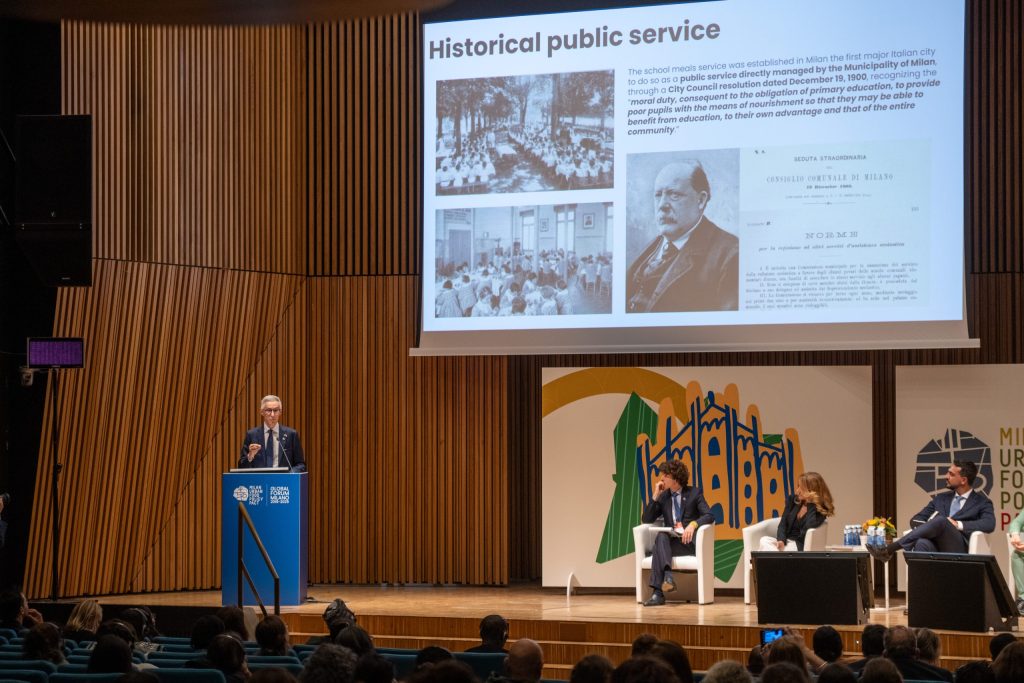
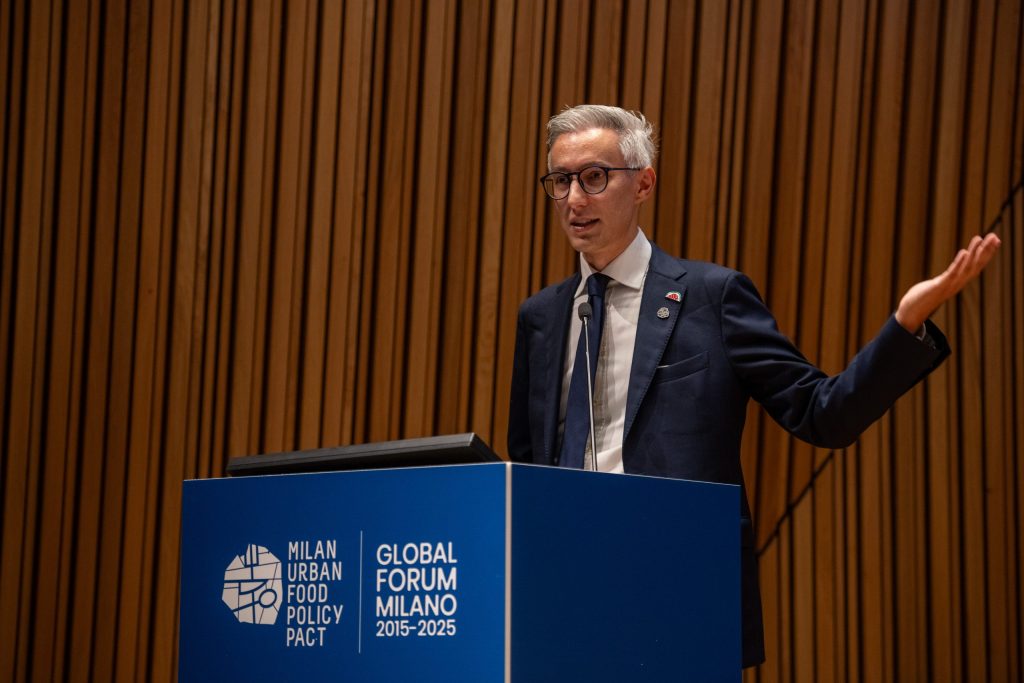
School Meals in ASEAN countries
To enrich the session with further international insights, Serena Duraccio, Asia Pacific Officer, MUFPP, showcased the Spreading Experiences and Knowledge on School Meals Programmes in ASEAN Cities, a project developed with ASEAN and funded by the Italian Ministry of Foreign Affairs and International Cooperation.
A key phase of the project was a summer school in Bandung, organized with the support of UNPAR, which provided city officers with knowledge on how they could improve, or even start, school meals programmes in their cities. In the case of Indonesia, for example, many cities had the necessity to start their programmes from scratch, learning about procurement, food waste, infrastructure, with an overview of all the aspects of the school meal system.
The project received great feedback from the 29 cities involved in the summer school from 8 ASEAN member states, and six cities with the most promising projects were selected to develop a feasibility study with the technical support of Milano Ristorazione. These cities (Bandung, Bangkok, Chiang Mai, Denpasar, Hoi An, Semarang), as explained by Giorgio Mariani, Design and Procurement Chief from Milano Ristorazione, had different needs that were acknowledged into the feasibility studies. Milano Ristorazione designed the layout of standard kitchens to be implemented, including all the specific details for its construction, taking into account the differences of territories, also to ensure safety and security checks that do not only focus on the kitchen centers but start back along the supply chain and also after the delivery to schools. The canteens’ environment was also studied, to ensure the inclusion of education facilities, for example with panels on the walls where children eat, to showcase the menu and explaining where the ingredients come from.
To turn these studies into reality, a new follow up project has been announced for the next year Boosting school meals in ASEAN cities: from knowledge to action, with the support of ASEAN and the Italian Ministry of Foreign Affairs and International Cooperation.
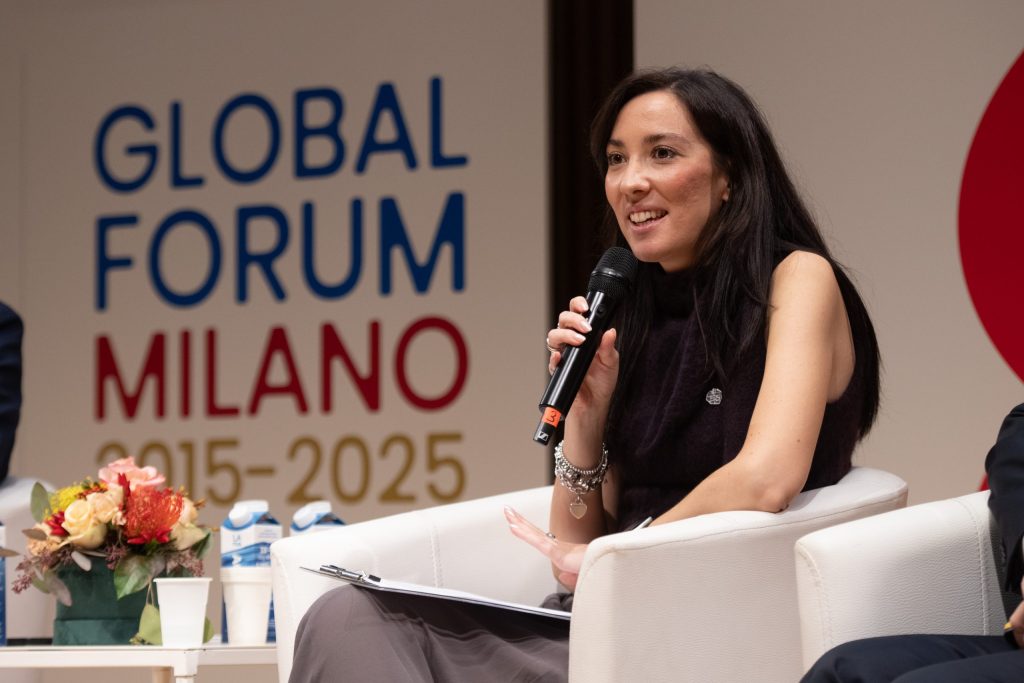
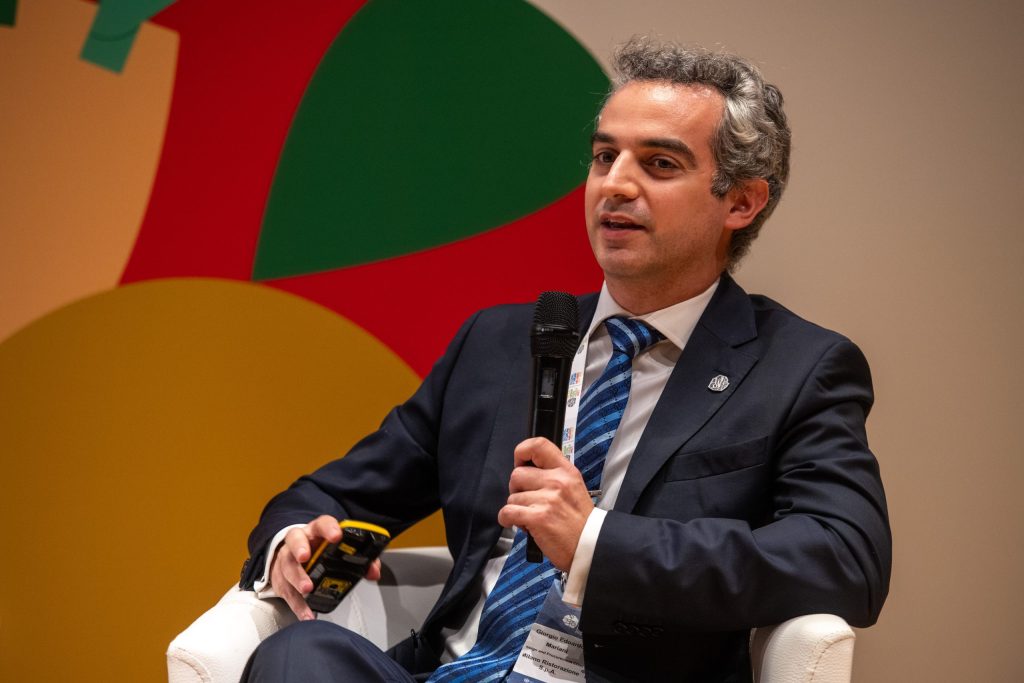
Champion Mayors
In the second segment of the session, some of the cities of the new cohort of Champion Mayors were welcomed on stage. Champion Mayors are city leaders among the MUFPP cities of countries that are member of the School Meals Coalition, who act as school meals pioneers and political ambassadors of the Cities Feeding the Future Initiative. They are Mayors who commit to placing school meals and sustainable food systems at the heart of their political agenda, while giving international visibility to the leadership of cities.
Semarang (Indonesia), Fortaleza (Brazil), Rufisque (Senegal), Lyon (France), Quezon City (The Philippines), and Bandung (Indonesia), demonstrated strong political leadership and transformative action, showing how school meals can drive health, equity, sustainability, and education at the local level while inspiring change globally.
The new cohort of cities confirmed their commitment by submitting a Letter of Commitment, outlining the Cities’ efforts in five cluster of commitments: political, affordability, sustainability, education and advocacy. Mayors submit these concrete, time-bound pledges to improve school meals, setting clear goals and steps to turn commitments into action.
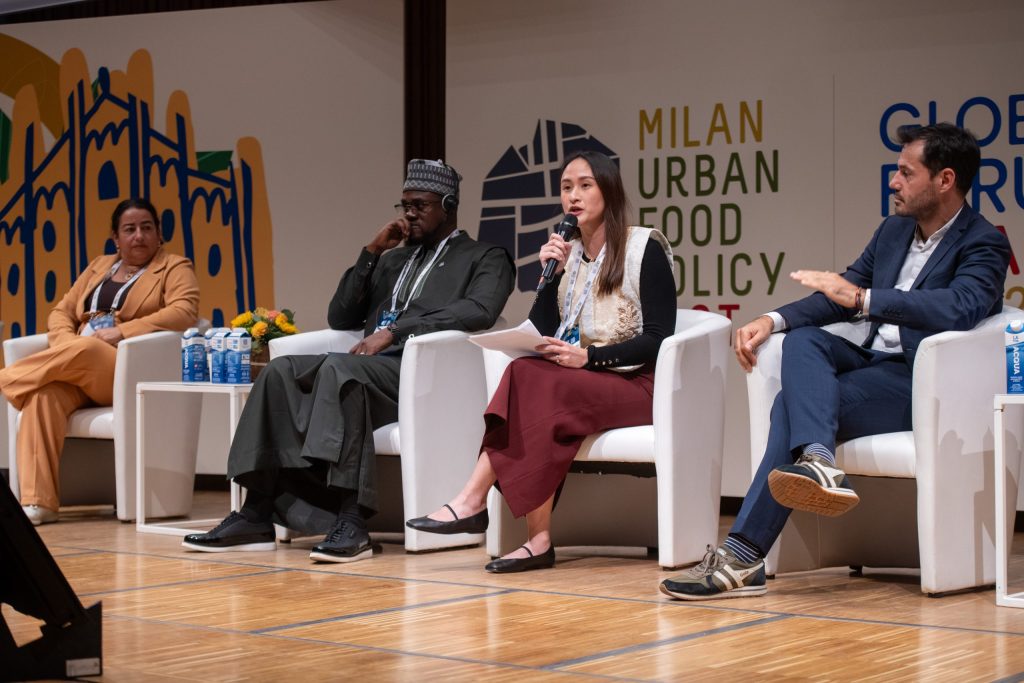
Political Debate
Semarang, Indonesia
The Mayor of Semarang Agustina Wilujeng Pramestuti affirmed her commitment in advancing sustainable urban food policies, and its full support for free nutritious meals programmes. With their programme Detektif Pangan (Food Detective), they aim to instil a diversified diet, balancing nutritious and safe eating habits among children. The recognition as Champion Mayor encourages her to support the school meals programmes and, as part of their commitment, they invited all MUFPP members to Indonesia to take part in the National Dialogue in Semarang.
Fortaleza, Brazil
Lídia Andrade Lourinho, Secretary for Early Childhood of Fortaleza, recalled the new reform on their school meals programmes thanks to which 270,000 children have been enjoying more nutritious meals. The new menu includes traditional dishes, such as the very popular “pratinho” served on Fridays, which reflects the cultural hybridity of Ceará’s cuisine, adapting traditional recipes, incorporating a variety of proteins, and shaping itself to the urban context. Children are involved in the design of the menu, together with all the educational community, and their feedback on food preferences is taken into account to ensure that the healthy meals is appreciated by them, to make them more open to healthier food choices also at home.
Rufisque, Senegal
Papa Mamadou Fam, President of the Rufisque Departmental Council, shared the start of their school meals programmes when in 2016 they understood the need of a canteen that needed to have a different role in the food system, testing 4 autonomous canteens that were installed in the schools, engaging in solidarity with local producers to build a better relationship and better local economy. Already in 2019, they could see the results: the canteens had contributed to improving the learning level of students, thanks to a nutritious and complete meal. Parents and the local community are involved also in the checking of quality and quantity of food, acknowledging the infrastructural limits of some part of the systems and the need to adapt them according to the context, starting with the central kitchen.
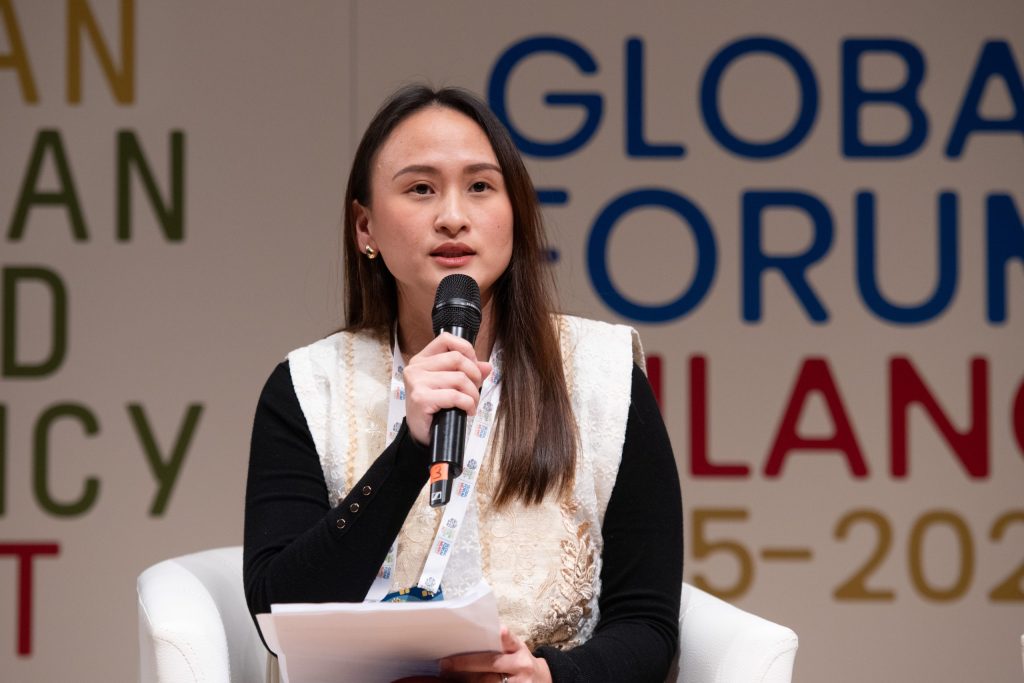
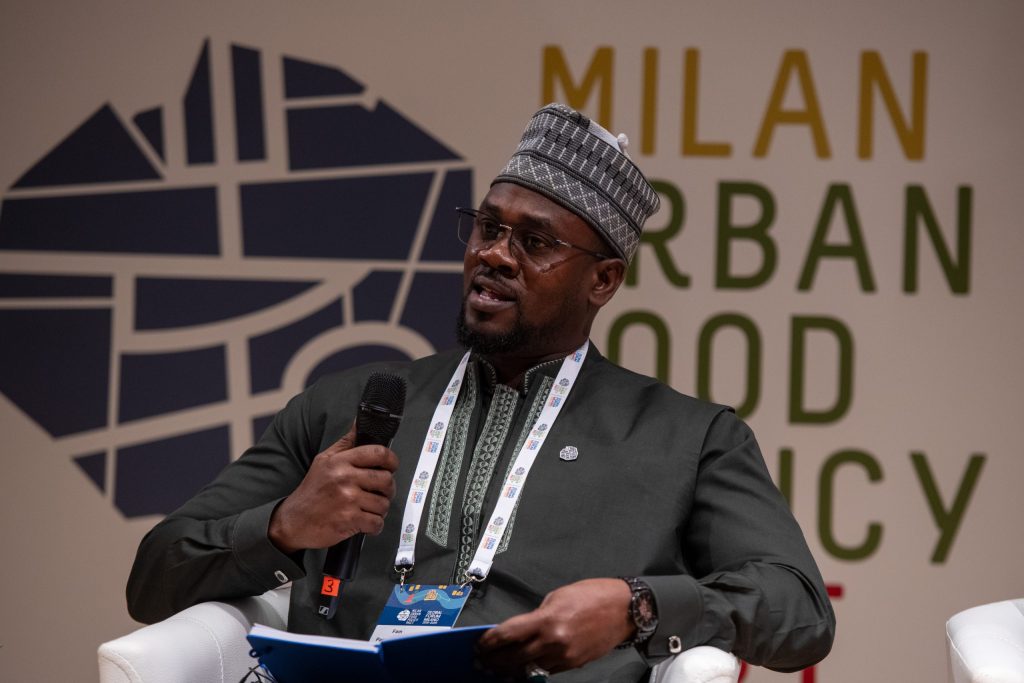
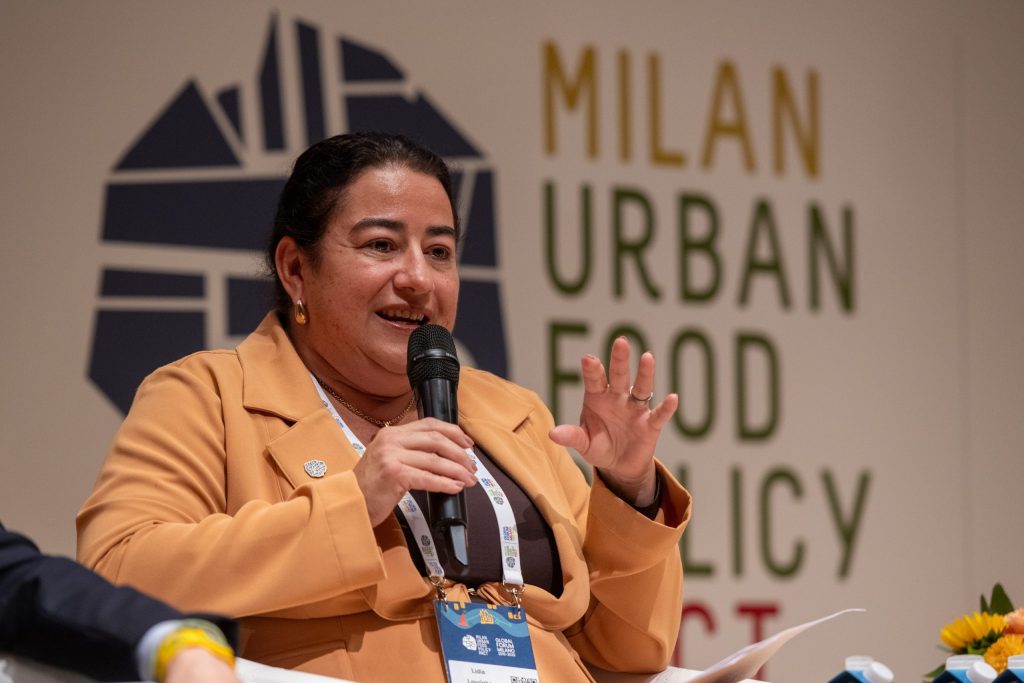
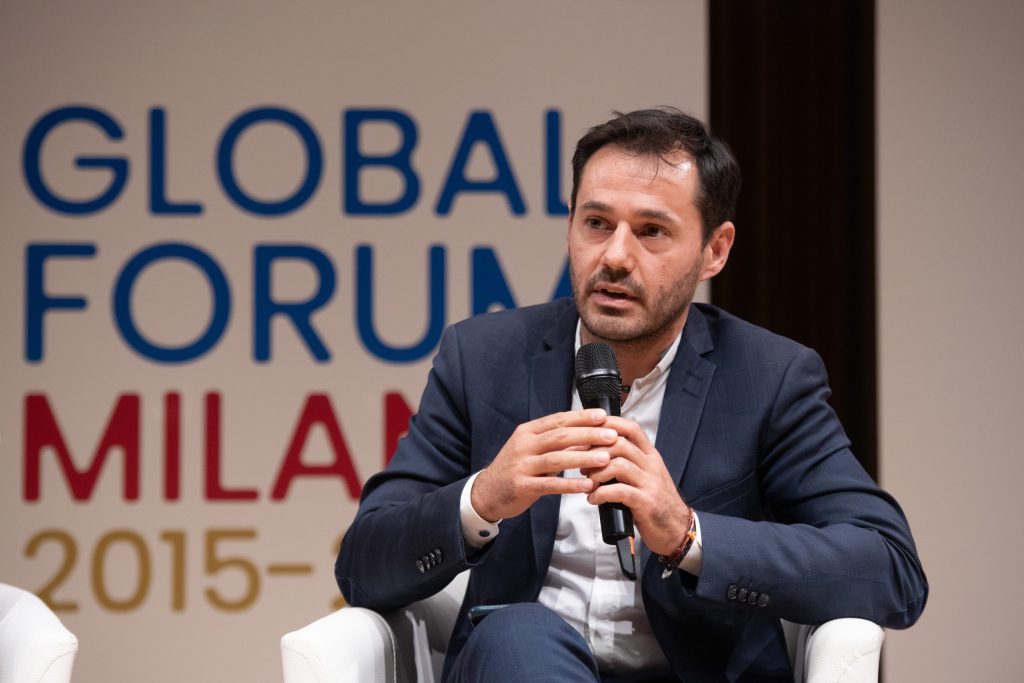
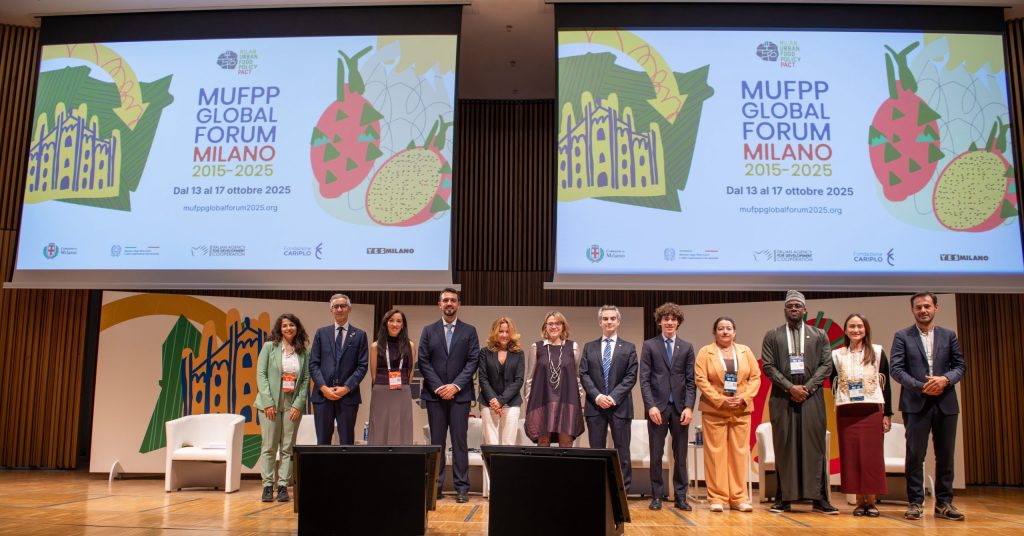
Quezon City, The Philippines
Julienne Alyson Rae Veloso, City Councillour of Quezon City, reported that the need to improve the school meals was driven by the evidence that in the Philippines one out of three people dies from non-communicable diseases before reaching the age of 70, with heart disease being the leading cause. In large share this is caused by unhealthy diets, linked with poor lifestyles. The Mayor Joy Belmonte in 2021 signed an executive order to avoid any public fund to be spent on unhealthy food, ensuring all food served in public funded events, or in hospitals, shelter homes, etc, must meet healthy standards, limiting sugars, sodium and unhealthy fats. Each year, they run an orientation programme for school canteens and food supply officers to ensure that nutrition standards are integrated into the budget plan, and to help institutions to source fresh food from local growers (involving over 1,400 farms), cutting food miles and increasing green jobs. This evidence-based policy design made healthy food the default in all the government spending, ensuring more accessibility and affordability for Quezon City’s citizens to eat healthier.
Lyon, France
Gautier Chapuis, Deputy Mayor of Lyon, Responsible for Greening, Biodiversity, Animal Welfare and Food, shared key figures from their school meals programmes, with 66% of ingredients supplied by organic producers within 20km from the central kitchen. All the canteens are or will be equipped by 2026 to recover the bio waste to revalorize it. In Lyon they are training more than 1,000 people thanks to the innovative “catering guide” they developed, with a pedagogic approach towards the kitchen staff, together with cooking courses and visit onsite to bridge the gap with food production. Children are very much involved also in the tasting of dishes before they are included in the new menu, to make sure they appreciate them, leading to lower food waste. The Deputy Mayor also acknowledged the importance of the Champion Mayors, as it is key to share best practice with the rest of the world, to inspire each other and develop together better school meals programmes.
Bandung, Indonesia
Muhammad Farhan, S.E., Mayor of Bandung City, expressed his commitment to provide healthy and nutritious school meals to more than 460,000 students every day, being school meals one of the pillars of their food system. Through school meals, they are able to support children’ health and the local economy of farmers, encouraging sustainable food practices through their food smart city initiative. School meals are an investment in their future, and they want to build a sustainable food system through their Grand Design Pangan, a long-term road map for food resilience, and continue to expand Buruan SAE, a community based local food initiative that could potentially supply the school meals system
The full session can be watched at the link below.
